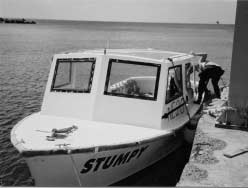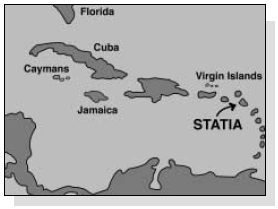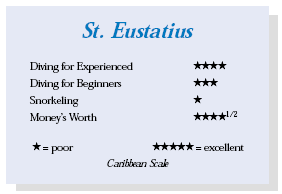St. Eustatius, Netherlands AntillesContents of this Issue: St. Eustatius, Netherlands Antilles Serious Shark Attack Raises Questions 24,700 Faulty Oceanic Regulators Death of a Free Diving Champion Is Your Gear Safe with Nitrox? Is That Welding Oxygen in Your Nitrox Tank? Editorial Office: Ben Davison Publisher and Editor Undercurrent 3020 Bridgeway, Suite 102 Sausalito, CA 94965 good diving that will only get better from the January, 2003 issue of Undercurrent
Dear Fellow Diver: St. Eustatius, a 20-minute flight from St. Martin, is off American divers' radar screens. Today only a thousand divers per year visit, many of whom are from Holland, her mother country, and Germany. Its reefs were once heavily fished and covered with fish traps. However, the Antilles government established a marine park down to 30 meters and, in 1998, began funding active park management. In 2001 the Coral Reef Alliance gave the marine park $10,000 to buy engines for its patrol boat and it has helped; for example, in November they nailed two poachers fishing in the park. While a decade ago an Undercurrent writer found it quite fishless, has the marine park improved things? I journeyed to St. Eustatius the first week of
December, and I can say that on land, for sure, it's my
kind of place. Full-time residents number about 2,100. The
hotel rooms number in the dozens. Besides climbing the 2000-
foot Quill, a dormant volcano, or taking long walks through
town, a good book is the next level of entertainment. Each
morning, a roving rooster would cock-a-doodle "Here Comes
the Sun." During the day, a herd of goats wandered the road
and hills, a couple of donkeys gnawed on greenery near the
hotel, and up in town a bull kept the grass short at Fort
Oranje. Each day, I walked the streets, passing gingerbread
houses, enjoying a Caribbean atmosphere that long ago disappeared
from islands like Grand Cayman. On one walk I heard
children playing, a dog barking, someone yelling "shame on
you," and one radio broadcasting news (as an old man on his
porch bent close, listening intently, just as my grandfather
once did), while another radio played "Hark the Herald
Angels Sing." The only urban noise came from one car
(maybe two) with woofers. Before departing for my venture, I contacted the two American-oriented dive shops, Dive Statia and Golden Rock Divers, to plan my trip. Dive Statia was expecting a group from Pennsylvania that week, which would fill their dive boat. Golden Rock, however, had openings and Michelle Fairies, who with her husband Glenn owns the operation, also handles e-mail reservations for the Old Gin House. Responsive and helpful with organizing my trip, she picked me up at the little Statia airport for the five-minute drive to the Old Gin House. The 19th-century Old Gin House, which only houses the restaurant and lobby, sits against a bluff on the lower road (most units are in a new motel-like structure). Across the road (on the shore) sits a new building that houses the retail part of the Golden Rock Dive shop, four lodging units, and a kitchen/bar that serves breakfasts, lunches, and cocktails in the small courtyard on the water. To the north about one hundred yards is Dive Statia's retail shop; to the south -- next door to Golden Rock -- is the Golden Era hotel and the SubAqua dive shop, which is run by a Swiss fellow who is fluent in English. (While he had American divers, what little marketing he does is essentially in Europe.) If one walks further south along the rocky shore studded with palm trees, a fifth of a mile farther is Golden Rock's working dive shop. It was here that I signed in with Benji (German) and Annouch (Dutch), a handsome couple, capable instructors and boat handlers, who were both fluent in English and other languages, and blessed with good humor. Annouch's infectious laughter always kept the day cheery. The two met in Bonaire nearly three years ago, then worked as dive instructors in places as diverse as Thailand and Yemen. While they don't plan to stay in Statia forever, they have settled in for the time being and are a great addition to Golden Rock. Glenn, a transplanted Texan who lived in St. Martin several years before coming to Statia in 1995, can often be found here as he also leads dives and drives gear for divers who don't want to walk from their hotels. Typically, to begin a dive, you set up your gear at the shop, carry it 30 feet, and hoist it onto a small pickup truck. The truck rolls backward to the end of a cement pier, where you unload your gear and hand it to the divemaster who puts it on the boat. If you wish, they'll happily do all the heavy lifting for you. For the first three days, the only three other divers present (including a
couple from Charlotttesville, Va, who told me that one reason they selected Statia
was because they had read good reports in the Chapbook) were taking an advanced
course. So I dived alone with Benji in the shop's ten-foot inflatable dinghy. To
board the dinghy, I climbed down the dock ladder and, with Benji's assistance,
stepped in. It was a bumpy boat ride to Hangover Reef, my first dive about a
half-mile offshore. Benji hooked the dinghy to the mooring, helped me with my gear,
and I backrolled in, dropping to the bottom -- fifty feet down. Visibility wasn't
much better than 50-plus feet, but the warm 80-degree water made up for it. On that single dive, Benji explained that we had covered parts of three dive sites as we had passed two additional moorings while underwater. Another day, we dived "Ledges," where a four-foot reef shark cruised by as I swam across flat, coral-covered terrain with a moderate current that quickly subsided when I finned over a five-foot ledge into a wonderland of fish and coral. Blue chromis and creole wrasse streamed in groups of a hundred. A small hawskbill, jacks, and Bermuda chubs schooling in the water column and black durgon were uncommonly approachable. Skittles of reef fish, parrots, a couple of queen angels, a lovely queen trigger, rock beauties, and grunts galore were all moving and swaying among plentiful soft corals. As we ambled back, a shiny, metallic African pompano passed slowly by, then a school of jacks followed. Under a ledge, a large lobster shined an electric blue; as I approached, she walked out to greet me. Near the dive's conclusion, a smaller reef shark passed, but soon after that a six-footer appeared, gracefully swinging its tail to power itself. In addition, I saw two dozen closely knit blue tangs as they rose and fell along the reef, viciously attacked by damsel fish as they flowed by. Several other dives I took were similar, rating among the best of reef dives I've seen in the Caribbean. The splendid coral is generally varied, with a wide range of hard and soft varieties. Fish are plentiful. I saw a few lobsters -- in fact, under one ledge I saw nine! And I missed a couple of eagle rays that others saw. On one occasion Benji even pointed out a bright yellow seahorse he knew where to find. So what's not to like? Statia offers several deeper sites, one of which is "Down South." Annouch piloted the 32-foot "Stumpy", sort of a "Little Toot" with ten tank holders and about an eight-knot maximum speed (they always put a DAN oxygen kit on board). We anchored a thousand yards offshore, backrolled in, then dropped to 60 feet, where again the coral was lovely and small fished played. A couple from Saba had joined the group, and we headed for deeper water, down over a sloping edge and sand patch, eventually leveling out near 120 feet. As I edged along a mini wall, deep water gorgonia and some black coral silhouetted a few small fish in the 90-foot visibility water. We gradually moved back up to the reef top at seventy feet, where a four-foot reef shark waited for us. Under the boat, plenty of yellow headed jawfish swayed above their holes, shopping for food, and I followed two orange spotted file fish. As I came across a patch of garden eels, a four-foot barracuda swam over to see what I was doing. After 45 minutes, I headed up the line for my decompression stop, entertained by a school of more than 100 bar jack streaming by.
For dinner, the Old Gin House was tops. A Belgian chef, in his foot-high white stovepipe chef's cap, produced superb and extremely well presented 4-6 course meals (about $40). I splurged twice and the highlights included an excellent fresh salad with roasted quail legs, a fine paté, sumptuously prepared fresh fish on a bed of yellow pepper sauce, Dutch roasted potatoes, tender asparagus plucked from the ground, a tomato flower, and one evening the proverbial "chocolate mousse to die for," with a center scoop of vanilla ice cream. The chef prepares only a couple of main courses an evening, but will take requests in advance. The setting is pleasant, either inside the rustic dining room at one of half a dozen tables or just beyond at poolside. (The tiny pool, by the way, sits between the main house and the motel-like building housing the rooms, up against the bluff.) One can, of course, eat elsewhere. Down the road, Smoke Alley has great music every Friday night, when several local gents play their favorites on acoustic guitar and banjo. On the two Fridays I was there, they served up good fish and chips and decent ribs, but other divers reported that on other nights the service was slow and the food poor. I tried lunch at the Blue Bead and the only sandwich available was a deep-fried, artificial-tasting chicken patty, but at dinner I had an excellent thin-crust pizza, similar to those served in Italian restaurants. At the Golden Era I got a tasty whole fried snapper (sans head), salad, mixed vegetables, and french fries -- a meal that (with two beers) came to $22. Ask Michelle for other restaurant tips, including which of the three Chinese restaurants to pick. While they're in town and not far away from the Old Gin House, one has to make a five-minute walk up a steep road to reach them. But, what the hey -- divers are supposed to be in shape anyhow, right? Dive Statia, which was the first shop on the island, has more gear and goods for sale than Golden Rock. Their boat holds about the same number of people comfortably (ten, max), and while it's a bit faster, that isn't a significant advantage in Statia. They put overflows in an inflatable. The one disadvantage: without a dockside dive shop, a truck lugs divers' equipment and suited divers back and forth between the dock and the dive shop for each dive. The owners managed the Cayman Diving Lodge before coming to Statia in 1994. On one dive we explored three wrecks -- a long barge, a scuttled wreck, and an upright tugboat -- that make homes for a variety of yellowtails, snapper, and the like. (There was usually a modest current, but one day it was so stiff divers only hung around the barge.) At the wrecks, I watched a garden of garden eels in the sand, one snow white except the tip of its head, then got nose-to-nose with an enormous southern stingray until its sides began to flutter and it slipped away. A large barracuda sat silently under the wreck. Benji led me through a couple of holes where the inside structure afforded excellent photo opportunities. Statia is home to a large oil storage facility and the laboring screws of a large tanker or tugboat often broke the underwater solitude for long spells; while this did not seem to alter the behavior of the fish, the loud roaring noise was disconcerting. St. Eustatius has a long and interesting history. In 1776, when it was under Dutch control, the governor was the first to recognize the American flag, sending Britain into a dither, but further enabling St. Eustatius to become the primary supply link between Holland and the U.S. -- a link that permitted American revolutionaries to survive and win. Statia's remarkable history -- it changed hands 22 times -- can be viewed in an interesting little museum in the center of town, where a couple of rooms are set up as they were in revolutionary days. There are nice turn-of-the-century photographs in the small museum at Fort Oranje. Statia was populated by slaves, who used blue beads as currency, and some can still be found occasionally along the shore. One day, we also made a dive at Blue Bead Hole, a quarter mile offshore. At 60 feet, I covered the featureless sand, looking for beads, pottery, and bottles. Other than seeing a pair of flying gurnards, the best we could do in terms of treasure was a coffee mug and a kitchen spoon, circa 1990. Incidentally, Glenn was the one who took us to the Blue Bead Hole -- Annouch had developed a toothache, so Benji accompanied her for a two-hour wet open boat ride to St. Kitts, since there was no dentist on St. Eustatius (although there is a medical school). So much for romantic, easy going, island living. As for accommodations, I decided to spring for the best room on the island, where the Dutch royalty had stayed, a two-room suite, simply furnished in antique replicas, on the water. It's in a new building across the road from the Gin House, where another suite and two singles are located. These are great rooms, contrary to rooms in the Gin House itself, which are too dark for my liking (if you're one of those folks who is only in your room to sleep, they'll be just fine, though the water pressure was weak, others told me). With that in mind, I might prefer Kings Well, down the road on a hillside overlooking the water, where the group from Pennsylvania resided the week I was there. It has sizeable, light, and airy rooms, many with balconies facing the water. And while I didn't eat there, reports about the food there were always very good. Or you might even try the Golden Era Hotel, next store to Golden Rock Divers. Its clean and simple rooms have balconies and many face the water. So Statia is a throwback, a fine venue for divers satisfied with a couple of tanks of good Caribbean diving, quiet days, and long walks; it is a return to yesteryear, thanks in part to an effective marine park. -- Ben Davison
|

I want to get all the stories! Tell me how I can become an Undercurrent Online Member and get online access to all the articles of Undercurrent as well as thousands of first hand reports on dive operations world-wide
| Home | Online Members Area | My Account |
Login
|
Join
|
| Travel Index |
Dive Resort & Liveaboard Reviews
|
Featured Reports
|
Recent
Issues
|
Back Issues
|
|
Dive Gear
Index
|
Health/Safety Index
|
Environment & Misc.
Index
|
Seasonal Planner
|
Blogs
|
Free Articles
|
Book Picks
|
News
|
|
Special Offers
|
RSS
|
FAQ
|
About Us
|
Contact Us
|
Links
|
3020 Bridgeway, Ste 102, Sausalito, Ca 94965
All rights reserved.

 People waved, cars honked "hello" as they passed, and once, when dark
clouds loomed, a fellow stopped to
give me a ride. "I don't want you to
get wet," he said. "Rain's acomin'."
People waved, cars honked "hello" as they passed, and once, when dark
clouds loomed, a fellow stopped to
give me a ride. "I don't want you to
get wet," he said. "Rain's acomin'." Within
the first ten minutes, I spotted three nurse sharks (3-5 feet), one swimming up to
eyeball me while the two others snuggled under ledges. A couple of hundred caesar grunts with black tails schooled, and ahead
two large jacks schooled with half a dozen
smaller horseeye jacks. Along the way I
spotted quite a range of reef fish including
queen angels, rock beauties, black margates,
and a couple of small tiger grouper under a
ledge. Coral was abundant with plenty of
large barrel sponges and soft corals such as
sea plumes and sea fans. At a sand patch
with tile fish, half-a-dozen yellow head jaw
fish caught drifting morsels. I came across
a natural formation that looked like a thick
layer of concrete, under which a couple of
large lobster resided. A small hawksbill
turtle ambled by. At the end of the dive,
we hung for three minutes at 15 feet, then moved up to the surface; I held Benji's
equipment until he climbed aboard, then he lifted up mine. Then, I kicked and
pulled myself over the gunwales (with his assistance) -- an entrance entirely
without grace! (P.S.: That they dive with only one diver is quite a plus!)
Within
the first ten minutes, I spotted three nurse sharks (3-5 feet), one swimming up to
eyeball me while the two others snuggled under ledges. A couple of hundred caesar grunts with black tails schooled, and ahead
two large jacks schooled with half a dozen
smaller horseeye jacks. Along the way I
spotted quite a range of reef fish including
queen angels, rock beauties, black margates,
and a couple of small tiger grouper under a
ledge. Coral was abundant with plenty of
large barrel sponges and soft corals such as
sea plumes and sea fans. At a sand patch
with tile fish, half-a-dozen yellow head jaw
fish caught drifting morsels. I came across
a natural formation that looked like a thick
layer of concrete, under which a couple of
large lobster resided. A small hawksbill
turtle ambled by. At the end of the dive,
we hung for three minutes at 15 feet, then moved up to the surface; I held Benji's
equipment until he climbed aboard, then he lifted up mine. Then, I kicked and
pulled myself over the gunwales (with his assistance) -- an entrance entirely
without grace! (P.S.: That they dive with only one diver is quite a plus!)  The three shops on the island
normally make two dives a day (they'll
easily arrange a third), at 9 a.m. and 2
p.m. or so, returning to the harbor
between dives so that people can go back
for lunch at their hotels. At the Old Gin
House, the fare included ham and cheese,
chicken salad, or shrimp salad sandwiches
on French bread or toast, accompanied by a
tasty salad ($4-$5). Hamburgers were
replicas of a McDonald's quarter pounder,
served with a salad and french fries ($8).
One could also go for larger meals such as
fried fish or steak with vegetables for
approximately $15. Pastas were offered,
but unavailable for several days while they waited for the supply boat that delivers
from St. Maarten on Wednesdays and Fridays. The Continental breakfast included a
few cereals, canned juices, toast, rolls, and sliced ham and Edam cheese. While
there is no menu, you can usually ask for eggs, bacon, French toast, and pancakes.
The three shops on the island
normally make two dives a day (they'll
easily arrange a third), at 9 a.m. and 2
p.m. or so, returning to the harbor
between dives so that people can go back
for lunch at their hotels. At the Old Gin
House, the fare included ham and cheese,
chicken salad, or shrimp salad sandwiches
on French bread or toast, accompanied by a
tasty salad ($4-$5). Hamburgers were
replicas of a McDonald's quarter pounder,
served with a salad and french fries ($8).
One could also go for larger meals such as
fried fish or steak with vegetables for
approximately $15. Pastas were offered,
but unavailable for several days while they waited for the supply boat that delivers
from St. Maarten on Wednesdays and Fridays. The Continental breakfast included a
few cereals, canned juices, toast, rolls, and sliced ham and Edam cheese. While
there is no menu, you can usually ask for eggs, bacon, French toast, and pancakes.  Divers Compass: Dive Statia:
Divers Compass: Dive Statia: 